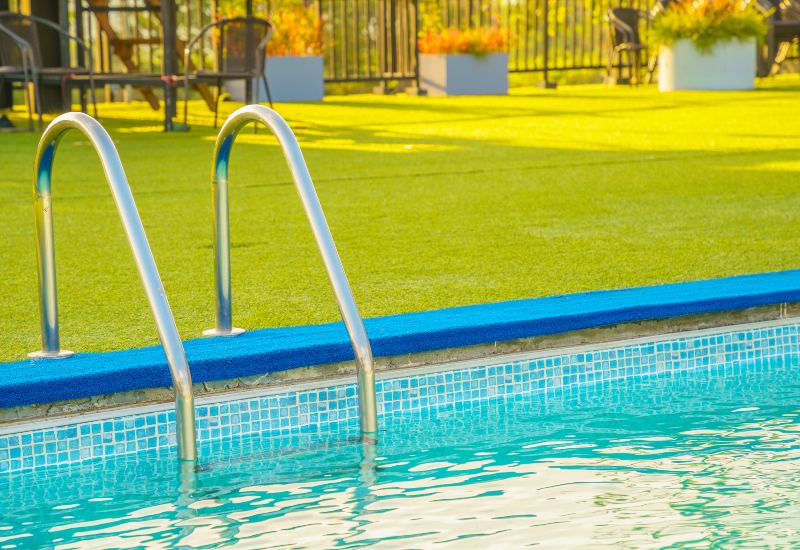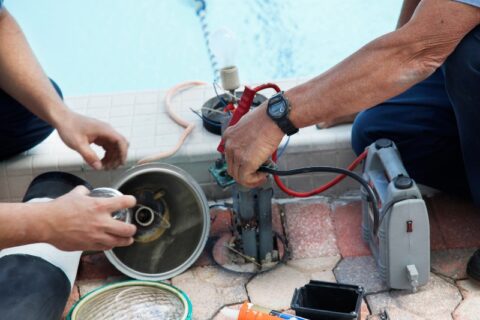Will Pool Water Kill Grass?
Having a backyard swimming pool is a great way to enjoy your summer days. But have you ever wondered if the pool water splashing onto your lawn could harm the grass? It’s a common concern among pool owners who cherish their lush, green lawns. Learn the effects of pool water on grass, whether chlorine or saltwater pools impact lawns the most, and ways to protect and restore damaged grass.

The Impact of Pool Water on Lawns
When it comes to backyard swimming pools, the primary culprits of lawn damage are chlorine and salt.
Chlorine is widely used in traditional pools to disinfect the water and keep bacteria, algae, and other contaminants at bay. While a splash here and there is unlikely to cause significant damage, chlorine can harm grass if the concentration is too high. First, chlorine can cause chemical burns on your lawn. Then, if chlorine leaches into the soil, it can throw off the pH balance and kill the grass.
Saltwater pools are becoming increasingly popular for their lower chemical content, but salt presents its own set of challenges for lawns. When saltwater splashes your grass, it increases the salinity of the soil, creating a difficult environment for plants to thrive. High salt levels lead to compaction, especially in soil with high clay content, restricting the grass’s ability to absorb nutrients and water.
Preventing Pool Water from Harming Your Grass
Maintaining a pristine lawn while enjoying your pool is a balancing act. Whether chlorinated or high in salt content, pool water will kill your grass if you’re not careful. Thankfully, there are plenty of ways to keep your lawn lush and green, even with a pool nearby. Here’s what to do:
- Don’t irrigate with pool water: It might be tempting to repurpose pool water for lawn irrigation, especially during pool cleaning or maintenance. However, this practice is sure to backfire. Always use fresh, clean water for your lawn to ensure its health and vibrance.
- Perform proper pool maintenance: A well-maintained pool is less likely to harm your grass. Regularly test your pool’s chemical levels and make adjustments as needed. Maintaining ideal chlorine levels reduces the risk of chemical burn on your lawn when water splashes out.
- Drain responsibly: You may need to drain your pool occasionally, whether for cleaning, pool repairs, or other maintenance tasks. Instead of draining onto your lawn, connect the outlet to the proper drainage system to carry the water away and avoid killing your grass.
- Keep pool gear off the lawn: Pool toys, floats, and swim trunks are often overlooked as potential hazards to your lawn. But when left on the grass, they can drip chlorine or salt into the soil, block sunlight, and restrict airflow, leading to patches of dead or discolored grass. Store these accessories properly after use to help preserve your lawn’s health.
Restoring a Lawn Damaged by Pool Water
If pool saltwater or chlorine has started killing your grass, all is not lost. Follow these steps to restore your grass to its former glory:
- Dilute the impacted area: If you notice areas of your lawn that seem affected by pool water, get out the garden hose and thoroughly water the affected spots to flush chlorine or salt from the soil. This process might need to be repeated several times over a few weeks, depending on the extent of the damage. The goal is to restore the soil’s natural balance and encourage healthy root growth, both of which are crucial for your lawn’s recovery.
- Remove weeds: Weeds are opportunistic and may move in if chlorinated pool water kills your grass. Weed removal is crucial for the recovery process. Regularly inspect your lawn and promptly remove any weeds poking through the soil.
- Reduce foot traffic: A lawn recovering from damage is particularly vulnerable to physical stress. Keep people and pets off the affected area while the grass regrows to avoid further soil compaction and stress.
- Reseed as needed: Reseeding may be necessary to restore your lawn fully. Choose a grass seed that matches the existing lawn for a uniform look. The best times to seed are during the spring and fall when temperatures are milder and there’s usually more rainfall.
Contact Millennium Pools & Spas for All Your Pool Work
With over 35 years of pool service experience, Millennium Pools & Spas is your source for top-quality pool maintenance and repair. We know you want a beautiful, functional outdoor space that doesn’t compromise your lawn’s health, and we offer professional advice and pool services to make this happen. For more information, please contact us at (703) 939-5062 to reach our Virginia/DC office or (301) 591-3750 if you’re located in Maryland.


